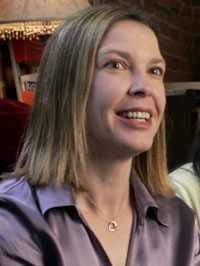 Lisa Cody, associate professor of history and former department chair, has been awarded the 2005 Best First Book Prize by the Berkshire Conference of Women Historians for Birthing the Nation: Sex, Science, and the Conception of Eighteenth-Century Britons (Oxford University Press, 2005).
Lisa Cody, associate professor of history and former department chair, has been awarded the 2005 Best First Book Prize by the Berkshire Conference of Women Historians for Birthing the Nation: Sex, Science, and the Conception of Eighteenth-Century Britons (Oxford University Press, 2005).
The committee of the Berkshire Conference of Women Historians described the book's scholarship as providing "a fresh perspective to an old feminist problem: the triumph of male doctors over the traditional, female midwife. Cody uses an array of documents including scientific texts, cartoons, gutter literature, and popular newspapers to show how men wrested control from women over conception and birth."
Kathryn Norberg Ph.D., an associate professor of history at UCLA and chair of the awarding committee, says Cody's book was selected over 60 entries from all fields of history. The honor is the most recent in a series of accolades for Cody's debut book, which also won the Frances Richardson Keller-Sierra Prize from the Western Association of Women Historians and the 2005 Phi Alpha Theta Prize of the History Honor Society, both for the best book in any field of history, and the Royal Historical Society, which placed Birthing the Nation on the shortlist for its prestigious Whitfield Prize. Cody also was honored with the Walter D. Love Article Prize for British History and the Judith Lee Ridge Article Prize for articles related to the book.
The competitive, prestigious award is a thrill for Cody, who says the honor was particularly meaningful because the prize committee is comprised of historians from all fields and periods. "Historians focus so tightly on specific time periods and problems," Cody says, "so it is rare for scholarly monographs to find readers in quite different fields.
"I think one of the reasons the book has grabbed the attention of three prize committees," Cody says, "is because the book is broad in time period, themes, and even geography. I think it also challenges the notion that the histories of medicine and gender are isolated, small, and disconnected from the master narratives of history."
Norberg says the committee of the Berkshire Conference of Women Historians applauded Cody's "extensive use of images" and her "ability to marry social history with the history of science.
"Cody's most important achievement," she continues, "is to show that birth is a tool for historical analysis, a tool which brings to light struggles over issues as key as gender relations, national identity, racism, and the growth of the modern state."
Birthing the Nation explores the greater implications of gender, reproduction, midwifery, and sexuality, according to their impact on the British identity. Cody argues that 18th Century Britons' lives were affected in every way religiously, politically, and socially by the changing opinions about mysticism, gender, and the birth process. She discussed her work at an Athenaeum lecture last spring.
-------Katherine Spada 08
